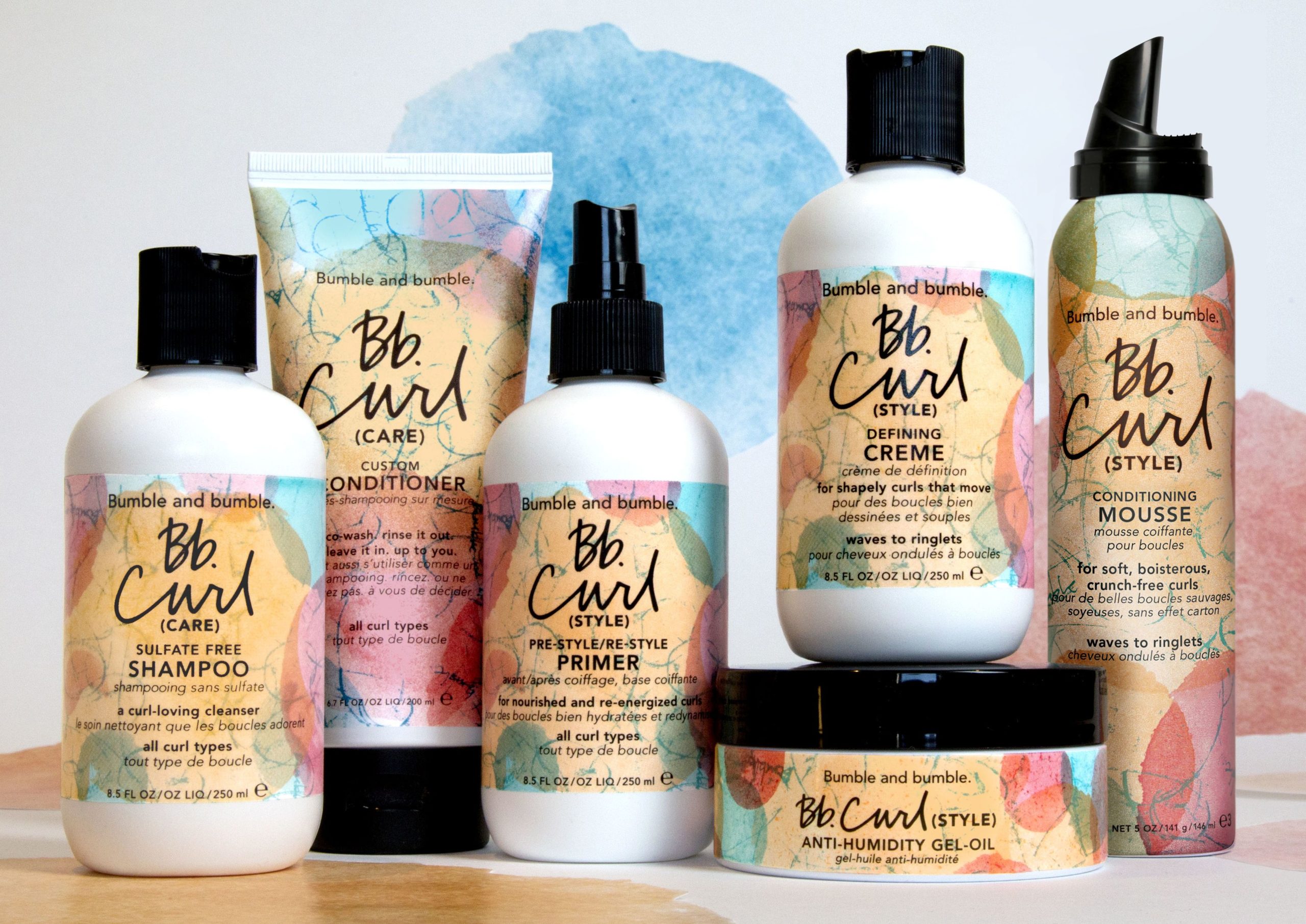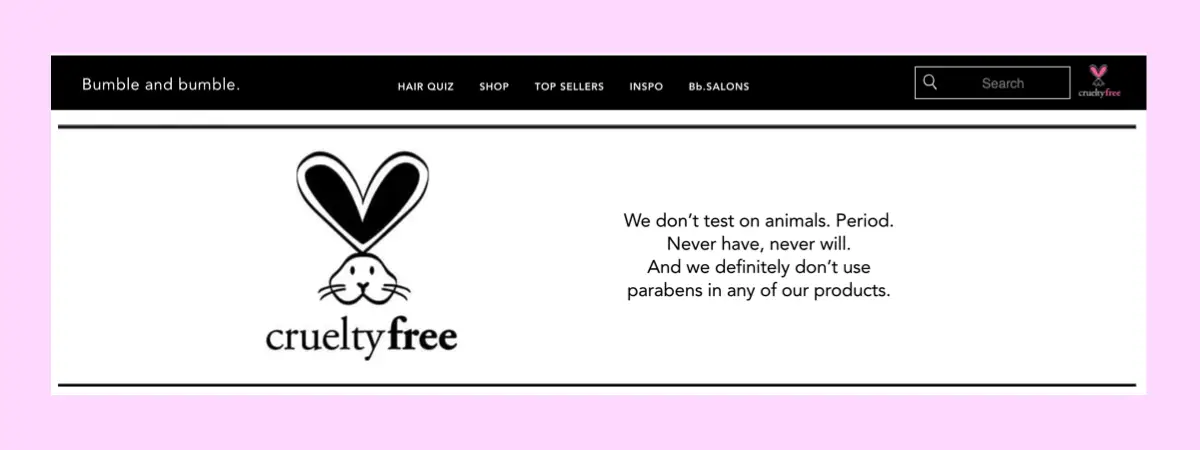‘Rooted in the craft of hair,’ Bumble and bumble. (also known as Bb.) creates products for every hair type, texture, and look imaginable. But is it cruelty-free and vegan – or just another cute brand without care for ethics?
Bumble and bumble. is cruelty-free. It doesn't conduct animal testing on its products, nor does it distribute its cosmetics where animal testing is required by law. While Bumble and bumble. does offer some vegan products, it is not considered a vegan brand.
Frustration with luxury hair care in New York salons pushed Bumble and bumble. founder Michael Gordon to innovate and create his own line of products.
So in 1977 – he developed Bumble and bumble.!
The line is driven by aesthetics, fashion, and embracing natural texture. And it’s only gone from strength to strength since its launch.
A massive mark of its success was when Estee Lauder acquired the brand in 2006!
But before you get too excited about buying these innovative products – you need to understand what you’re buying into.Is Bumble and bumble. Cruelty-Free and Vegan?
Bumble and bumble. is 100% Cruelty-Free
It does not:
Bumble and bumble. is PETA certified – which is a good start!
Unfortunately, it’s not an internationally recognized certification that guarantees a brand is cruelty-free.
Some other bitter news is that Bumble and bumble. is also owned by Estée Lauder – which is definitely not a cruelty-free company.
This brings us to our next point:
Bumble and bumble. is Not Vegan
Although the brand is not entirely vegan, Bb. has a good range of vegan products from which to choose.
But they don’t label any of their vegan products clearly – so it’s nearly impossible to know what’s vegan just by looking at their website.
Some of the most common animal-derived ingredients that Bb. uses are:
If you're interested in which products are vegan or finding vegan brand alternatives – keep reading or click on this link: Bumble and bumble. vegan products.
Animal Testing Policy and History
Bumble and bumble. has been going strong since 1977 (45 long years!).
The brands claim to have never tested on animals, and they’ve even managed to keep PETA accreditation after being bought by Estee Lauder.
They also say that they will never test on animals in the future.
Cruelty-Free Status in 2022
Here is a screenshot of Bumble & Bumble’s official statement regarding its cruelty-free policies and vegan products, taken from its website’s homepage:
Certification
Bumble and bumble. is PETA certified, which is not a bad start.
However, it would be nice to see more certification since it’s so proudly cruelty-free.
While you might know PETA very well – it surprisingly doesn't hold the strictest cruelty-free regulations. It seems only to require a brand's written consent that abides by the PETA code of conduct.
Certification from Leaping Bunny is ideal because it holds rigorous standards and does regular audits to ensure they are upheld.
The Leaping Bunny association is very strict and reliable, which ensures that:
If you see a bunny stamp on the back of your product bottle – that's an excellent sign. But don't let the image itself fool you. A lot of brands are using fake logos to deceive consumers.
Do your homework and see which products are genuinely cruelty-free first. This article will help you: Which Cruelty-Free Logos Can You Trust?
Is Bumble and bumble. Sold Where Animal Testing is Required By Law?
Bumble and bumble. does not distribute any of its products to China or any country that requires animal testing on cosmetics by law, except via third-party sites like Amazon.
This bypasses the animal testing requirements set by Chinese governance.
China has a shocking track record. It is the country with the most animal testing globally, with over 20 million animals used per year.
However, if you live in China or are concerned about its cruel beauty policies, there are a couple of loopholes.
Here's how to find cruelty-free cosmetics in China: Are Cosmetics Made in China Cruelty-Free?
What Bumble and bumble. Products Are Vegan?
Bb. uses animal-derived ingredients in its products, like beeswax, honey, pearl protein powder, and lanolin in some of its products. Many would consider this 100% vegetarian.
As we mentioned above, none of the vegan products are marked clearly on their website.
So it’s not that easy to find anything vegan without painstakingly googling each ingredient. (Which we did, by the way.)
Now we want to save you some time and share some of Bumble and bumble.’s most popular vegan products:
Since Bumble and bumble. does not have a dedicated page for its vegan products; you can email customer service and ask them any ingredient-related questions you have.
Vegan Alternatives to Bumble and bumble.
If you are vegan or are a strong advocate of cruelty-free cosmetics – Bumble and bumble. may not be the right brand for you because of their parent company.
For us, it’s about presenting the facts and leaving the decision up to you.
Luckily, there are many alternatives you can find that are certified cruelty-free and vegan to choose from.
Here are some nature-inspired haircare brands within the same price range that are 100% vegan and cruelty-free.
Is Bumble and bumble. Natural and Organic?
Bumble and bumble. is a nature-inspired brand that tries to use a high amount of natural ingredients in each product.
Could we consider it a “natural” product range – hmmm? No.
Although Bumble and bumble. might use some organic ingredients, it is not certified organic, nor does it advertise itself as a natural or organic brand.Clean vs. Natural Ingredients
The term "natural" is not regulated for cosmetics and skincare. In other words, it doesn't hold one specific meaning.
Usually, it means a product is free of certain more toxic synthetic ingredients, including parabens, phthalates, sulfates, and more. But people also interpret "natural" to mean ingredients of immediate plant origin.
Here's the thing: "natural" is not necessarily good. Just because an ingredient is natural (take egg whites, for example) doesn't mean you should rub it on your scalp and risk a salmonella infection!
All products use a certain amount of synthetic ingredients in their formulas. Bumble and bumble. is no exception – but it does choose to use better or clean synthetics.
If a synthetic ingredient is "clean," it means it is safe and non-toxic for us. Its purpose is to preserve the stability of a beauty formulation.
Does Bumble and bumble. Use Safe Ingredients?
According to Skin Safe, Bumble and bumble. has a 73- 100% allergen-free ranking across 172 products.
All Bumble and bumble. products are free of parabens, phthalates, mineral oils, formaldehyde, and its donors.
The brand also stays clear of ingredients like MCI/MI, nickel, soy, Propylene Glycol, irritants, and dyes.
Reading the ingredient list is crucial because Bumble and bumble. is not 100% hypoallergenic or non-comedogenic, and they do not claim to be.
However, certain products are specifically for these concerns, so make sure you buy what your hair and scalp need.
The EU/UK Have Stricter Ingredient Regulations
We don’t want to scare you, but you HAVE to read up on any product’s ingredient list before you make a purchase – especially if you live within the United States. The reason why will shock you.
The FDA has only banned or restricted 11 harmful chemicals from cosmetics within the country. Europe and the UK, on the other hand, have banned 1,328!
Bumble and bumble. is a relatively good example of safe beauty ingredients, so you shouldn’t have to worry about any serious hidden nasties in its products.
But that doesn’t mean you should stop checking your product labels! With hair care, you want to avoid these ingredients:
Are Cruelty-Free Ingredients Safe?
If you’re worried about how safe it is to use cosmetics not tested on animals – please relax and take a sigh of relief.
There is no reason why cruelty-free products shouldn’t be as safe as anything tested on animals.
Not only is it easy to test ingredients without using animals altogether, but there are so many pre-approved ingredients you can use to make cosmetics that there is no need.
If you’re interested, here’s more on the subject: Are Cruelty-Free Cosmetics Safe?
Is Bumble and bumble. Sustainable and Ethical?
Something commendable about Bumble and bumble. is that it wants to be transparent with its customers.
It recently improved its carbon footprint and ensures its consumers are well informed about it.
One of the social causes Bumble and bumble. supports is breast cancer research and awareness by allowing consumers to add donations to their carts.
It's no secret that the world has a huge waste problem, and cosmetic brands only make it worse by using unsustainable packaging and harmful ingredients.
Some of the ways Bumble and bumble. is taking strong environmental accountability:
We would love to see more developments like these:
Final Thoughts
Bumble and bumble. is a well-developed haircare brand that takes various ethical factors into consideration.
They are cruelty-free and have various vegan options, which is a step towards a more sustainable future in cosmetics.
We also love their supply chain transparency and how open to the public they are about their testing, purchasing, and distribution policies.
Of course, since Bumble and bumble. is not 100% vegan – it might not be the best choice for activists who go the extra mile. Especially since its parent company endorses animal testing by selling other brands in regions where it is legally required.
We leave it up to you to decide.
Finally, it would also be nice to see further cruelty-free accreditation from other reputable organizations.
If you feel the same way – share your thoughts with the brand! It's the only way to make it happen!


